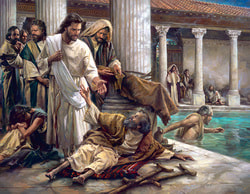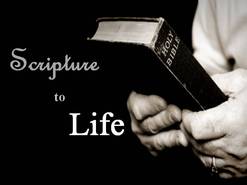|
As we embark on yet another faith-filled adventure of a New Year and with it the thought of all those New Year’s resolutions, I would like to invite you to reflect with me on Jesus’ words offered to the Pharisees in the Gospel of Mark:
Likewise, no one pours new wine into old wineskins. Otherwise, the wine will burst the skins, and both the wine and the skins are ruined. Rather, new wine is poured into fresh wineskins. (Mark 2:22) Jesus, throughout the Gospels, is always inviting us to examine and “re-view” the condition of our hearts above everything else. His words above, albeit confusing at first, shed light on His Heart and His promise to us: “I have come that they might have LIFE and have it more abundantly” (John 10:10). I think we would all agree a more abundant life is what we pray and hope for at the beginning of each New Year. The rising question, however, is “how do we get there?” The answer, I believe Jesus offers us, is contained in His advice given to the Pharisees. He says the pathway to an abundant life lies within the condition of our hearts – the readiness of our “wineskins.” Our hearts like the wineskins, Jesus says, must be constantly renewed and “refreshed” ready to hold that new wine or grace He is always willing to give to us – and thus become for the world a witness of “grace at work.” You see, the Pharisees were so concerned with the do’s and don’ts on their list that their identity, as children of God, was lost in a sea of narrow-minded laws and disciplines. They gave up the opportunity for new wine and new hearts! Even though the prophet Ezekiel proclaimed that God wanted to give them New Hearts all along (c.f. Ezekiel 11:19), they didn’t want to give up their “old wineskins” (old hearts) and place the “new wine” (grace) Jesus was offering them into “fresh wineskins” (converted hearts). In fact, this is what happens to many people and their “New Years resolutions” when their hearts remain unchanged and unaffected by Grace. They sometimes end up rejecting their resolutions because they had nowhere to store the new wine that Jesus offered them. They couldn’t see beyond the “do’s and don’ts” – the “idols” they had created for themselves are powerless towards true change. We must never allow our resolutions to become idols separated from the truth and light of Grace within our hearts. For only those who are pure in heart will see what God is truly offering them (c.f. Matt 5:8). And so, in this sense, I would offer that the goals and resolutions we set every year are re-viewed according to the condition of our hearts. “Re-viewed” so that we’re careful the “new wine” (grace-filled change) Jesus offers us this New Year isn’t going to be poured into the same old “wine-skins” or wasted in a bucket of “empty promises” we often leave ourselves with. But, that our hearts are truly renewed and store within them the new wine, the new life, the new truth of who we are and meant to be. Thus, in keeping our hearts renewed, we prevent the grace-filled resolutions (“new wine”) we accept from Him for this New Year from becoming just another space to fill up on the old “to-do” list (“old wineskins”) that is quickly abandoned and lost altogether. Jesus, this New Year, is offering us an opportunity to really accept something completely new and re-energizing –a new heart ready for His grace to fill it and complete it. I’m talking about experiencing a real encounter with Jesus and a true conversion of the heart! I believe that understanding our New Year’s resolutions from this perspective will inevitably lead us to a deeper relationship with Him and most certainly place us on the road to becoming the person we’re meant to be – physically, mentally, spiritually, the best version of yourself! At last, new wine in fresh wineskins! Bart Zalvetta is a member of the Theology Department of Skutt Catholic High School in Omaha, Nebraska
0 Comments
As we draw nearer to the end of the celebration of the Year of Faith I think it is important that we not lose site of the crucial call of the New Evangelization. In effort to sustain the energy, enthusiasm, and inspiration we all drew from the Year of Faith, we should not forget what it is that we’re up against. The enemy can only reach a vantage point if he is ignored and therefore permitted to advance his position and plan of attack. This is what I hear the Bishops warning against in the following excerpt in which they discuss the obstacles to the transmission of the faith.
“The principal obstacles to the transmission of the faith are the same everywhere and arise from within the Church and the Christian life, namely, a faith which is lived in a private and passive manner; a person's not feeling the need to be instructed in the faith; and a separation of faith from life. The responses also mention obstacles from outside the Christian life, especially from culture, that make it difficult and perilous to live and transmit the faith: consumerism and hedonism, cultural nihilism; and a closure on transcendence which extinguishes any need for salvation.” The response from the Bishops is two-fold: 1) Obstacles from within and 2) Obstacles from without. I don’t know which to fear more? Perhaps, the obstacles that exist from within are more detrimental to the life and mission of the Church than the obstacles that arise from the outside. Nevertheless, we can be sure that a combination of the two can be deadly to the spiritual life. I know in my personal life there are many times in which I have chosen a “private and passive” manner of living out my faith that was certainly influenced by the culture. I don’t need to go to Mass, I don’t need to confess my sins to a priest, I don’t need to visit the sick, I don’t need to donate or give my money for the benefit of the Church or others, I don’t need to stand out on a public sidewalk with a sign that causes people to reflect on how abortion hurts everyone. And so on, and so forth. My faith, so I thought was fine the way it was: “personal and passive.” Except that’s not the way Faith was meant to be lived. Faith, like life, is not meant to be lived in isolation! We are social beings with a need for communion! We can’t allow an individualized, “what’s in it for me” type of culture to get us to think sharing and living out our faith in communion doesn’t matter! I am fully aware of this now and my vocation to teach reminds me every day that I am not called to be a passive receiver of the Gospel but an active “re-gifter”! Bart Zalvetta is a member of the Theology Department of Skutt Catholic High School in Omaha, Nebraska “For in hope we were saved. Now hope that sees for itself is not hope. For who hopes for what one sees? But if we hope for what we do not see, we wait with endurance.”
-Romans 8:24-25 (full passage found here) In this passage and throughout his letters, St. Paul directs us through (not around) the darkness of suffering into the great light of faith that brings hope to those who know and love Jesus Christ. In his letter to the Philippians, he urges us to offer everything, especially our sufferings, with the hope of conforming our lives to Christ’s own sufferings so that we might in turn be conformed to His resurrection. “For creation awaits with eager expectation the revelation of the children of God; for creation was made subject to futility, not of its own accord but because of the one who subjected it, in hope that creation itself would be set free from slavery to corruption and share in the glorious freedom of the children of God.” - Philippians 3:8-10 My wife and I recently suffered through the pain-filled loss of a miscarriage. When we first heard the news we were absolutely devastated, heart-broken to say the least. Living through this experience, made me painfully aware of the fragility of life, especially life in the womb. In fact, later that evening I was scheduled to direct a pro-life youth rally for the 40 days for life. I couldn’t fathom how someone would actually voluntarily take a life from the womb of its mother. I believe this experience has caused me to suffer twice as much heart ache. I am terribly saddened because of our loss and terribly saddened because of the realities of abortion. With nothing save our Faith to comfort us and in holy surrender, my wife and I offer up our baby’s life for the conversion of hearts, especially for those considering abortion. A few weeks ago, I was praying across the street from a Planned Parenthood abortion facility when I noticed a young woman sitting in her car that was parked next door in front of the pro-life pregnancy resource center. However, I knew on this particular day of the week, the center was closed so I wondered who she was and if she needed help. After a brief interior struggle as to whether or not I should approach her car and speak with her I started walking towards her. I had been to Mass earlier that morning and I remember asking our baby, whom we named “Charlie,” to intercede for women in crisis pregnancies. I didn’t put two and two together while I was experiencing all of this but my prayer was about to be answered. The young woman in the car was in crisis and nobody, except me (and Charlie), was around to help her. I introduced myself, told her who I was (pro-life advocate) and that I was there to help her find the assistance she needed. I was able to lead her to another resource center that was nearby and assured her that there were people in this community that would be with her and support her every step of the way. I thanked her for choosing Life! For St. Paul, it is through the great acceptance of or rather surrendering to (and patiently enduring) life’s suffering, that we obtain the imperishable and eternal crown of victory (c.f. 1 Cor 9:25); a victory in his faith-filled eyes incomparable to the passing experiences of a lifetime no matter how grave. For it is true, no-thing compares to the glory that awaits us; for eye has not seen and ear has not heard what God has ready for those who love Him (c.f. 1 Cor 2:9). Bart Zalvetta is a member of the Theology Department of Skutt Catholic High School in Omaha, Nebraska The story of the Blind Bartimaeus is one of the most telling encounters between Jesus, our Savior, and our broken humanity so critically in need of salvation. The truth is we are all Bartimaeus’; we all deeply desire to receive the sight or “insight” only the Lord can provide.. But what is it that we long so much to see? And, what keeps or blinds us from seeing it?
I believe, as experienced in my own life, we all long to see that which all other sight is meant for, the Way. That is to say, we all long to see the way to our healing, our happiness, our security, but most of all we all truly long to see He who is the Way to our salvation. So what keeps us from seeing Him who is the Way, the Truth and the Life (Jn 14:6)? My own sight has often been blinded by the fears and anxieties brought on by the brokenness of my own human condition and triggered by the brokenness of a fallen world, itself so desperately in need of seeing the way of salvation. This anxiety that so many of us struggle with can lead to a type of spiritual blindness with, perhaps, more drastic consequences than any Bartimaeus’ physical blindness had caused. This spiritual blindness is the type that can challenge or even cripple the strongest of faiths. Yet, like many of the paradoxes found in scripture, this blindness can, through the Grace of God, serve to open our senses to what we must hear: the footsteps of the One who approaches. And if, like Bartimaeus, we come to courageously trust our Lord and learn to turn away from the surrounding fear that disables our discernment, what we really come to hear is His voice calling us; giving us our vocation to come and follow him: “On hearing that it was Jesus of Nazareth, he began to cry out and say, "Jesus, son of David, have pity on me." And many rebuked him, telling him to be silent. But he kept calling out all the more, "Son of David, have pity on me." Jesus stopped and said, "Call him." So they called the blind man, saying to him, "Take courage; get up, he is calling you."(Mark 10:47-49) When I hear the story of the blind Bartimaeus I can’t help but reflect on my own encounter with the living Savior, especially as He passes through my mind and heart amid the pangs of a hostile and blinding crowd of anxious emotions. Another particularly telling part of the story is how Bartimaeus, the “son of honor” repeatedly calls out to our Lord the, “Son of David”. King David was a man, much like Bartimaeus, who was destined for honor and dignity. Yet, he was blinded by his own brokenness and crippled by the powerlessness he felt against his own humanity. King David, like Bartimaeus, in Psalm 51 cried out to God with an unwavering confidence in God’s Divine Mercy. My own battle with anxiety has led me to cherish a deep sense of humility. I am not in control, I don’t have all the answers, I often cannot endure on my own, I need others, I need communion, I need Christ. Moreover, we hear the words of the prophet “be not afraid, I am with you” (Isaiah 41:10). And again, we continue to hear the words of St. Paul and all the martyrs who boasted of their weaknesses which won for them the strength of Christ (c.f. Cor. 12:9-10). So let us cry out! With all humility and confidence and faith in the words of another one of Christ’s redeemed…Domine, si vis, potes me mundare! “Lord, if you wish, you can make me clean.” (Mt. 8:2) Bart Zavaletta is a Theology teacher at Skutt Catholic High School in Omaha, NE. Our Church breathes through the two lungs of Scripture and Tradition, and as members of the Church we are called to do the same to live a flourishing life. The Catechism of our Church explains the importance of Scripture saying, "And such is the force and power of the Word of God that it can serve the Church as her support and vigor, and the children of the Church as strength for their faith, food for the soul, and a pure and lasting fount of spiritual life" (CCC 131). In order to inspire a life of apostolic vocation with strength and vigor, we begin today our first installment of the "Scripture to Life" series. Through the intercession and example of Our Lady, Mother of God and Queen of Apostles, we hope that the Word of God may be enfleshed by you.
Throughout my spiritual journey I have always struggled with pinpointing the virtue of humility in my life. I don’t think this is due to any lack of desire for the virtue, (it usually isn’t) but rather a lack of true understanding of the virtue. In the Gospel passage of John 13, Jesus washes the feet of his disciples and as he approached, Peter asked, “Master, are you going to wash my feet?” Whenever I read this passage, I always anticipate what Peter says next: “You will never wash my feet!” For some reason, I am always drawn to Peter’s stark rejection of Jesus’ perfect example of humility. If you have practiced lectio divina before, you know that when a part of Scripture confuses the heck out of you, that is exactly the point where you must stop reading, close your eyes, and listen.; It is specifically in this moment that God seeks to transform you through the power of his living word. My meditation on this passage continues with reflecting on exactly what was going through Peter’s mind and heart at the moment of his objection: confusion and feelings of extreme discomfort. It is as if Peter, like many of us who strive for, yet lack the fullness of this most necessary virtue of humility, is saying: WAIT! I don’t understand! Why are you asking me to go this far outside of my “comfort zone” in order to be your disciple? One of the ways I ask my students to relate to Peter’s level of discomfort is by asking them to consider allowing me to wash their feet in front of their friends. As they all cringe and shout “that’s disgusting”, I simply say, multiply your level of discomfort by ten and that is probably how the apostles felt when Jesus began to wash their feet. Nevertheless, Jesus’ invitation to his apostles to accept this teaching is vital to their emerging role in the building up the Kingdom of God and one of extreme importance to his mission of salvation. His disciples must go beyond all levels of comfort in order to serve Him and to create His Kingdom on earth. Likewise, this invitation is extended to us, who are called to be apostles of Christ by joining in the Church’s mission of evangelization. However, like Peter (as well as my students and myself) most Christians in today’s world, cringe when Jesus invites them to serve in ways that take them beyond their comfort zone. Jesus is saying that it is precisely in the moments that lead us beyond ourselves, our fears and our assumptions, that we can do the greatest good in witnessing to the New Evangelization and building up the Kingdom. The great missionary and witness to the New Evangelization, Blessed Teresa of Calcutta once said, “Always take the more difficult road.” To me, there is no path more difficult than the path of humility and yet none more fulfilling. I have felt extremely uncomfortable at times when discerning the call of the Holy Spirit! Nevertheless, like Peter, I am immediately reassured with the words of Jesus’ gentle response: “What I am doing you do not understand now, but you will understand later.” Our task then, like Peter’s, is learning to respond with true understanding and true humility; for this is essential to our Christ-filled witness in the New Evangelization. Jesus, in this paradigm, testifies that when we reject the sin of self-absorption and are ready to serve selflessly we pave the way for God’s people to enter into the Kingdom of God: “For everyone who exalts himself will be humbled, but the one who humbles himself will be exalted.” Lk 14:11 Bart Zavaletta received a B.S. in Kinesiology from the University of Houston and a M.A. in Theology from the Oblate School of Theology, and currently teaches Theology at Skutt Catholic High School in Omaha, Nebraska. |
Details
Archives
July 2024
Categories
All
|
About |
Media |
© COPYRIGHT 2024 | ALL RIGHTS RESERVED






 RSS Feed
RSS Feed